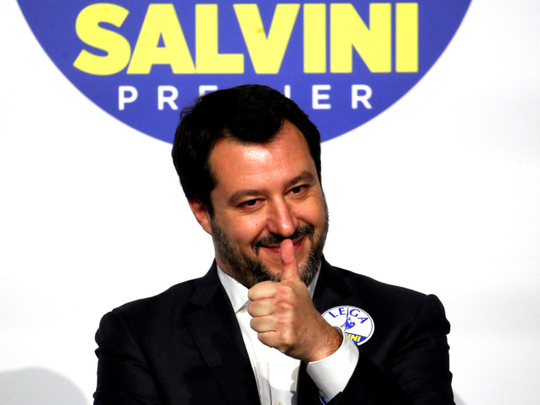
The big victors in Italian elections were the relatively new, ideologically vague, anti-establishment Five Star Movement — which got the most votes by a wide margin — and the far-right, ferociously anti-immigrant League, which exponentially improved its standing from just a few years ago.
That outcome was characterised as the triumph of populism. But it was a triumph for Russian President Vladimir Putin, too: Proof that many Italians have jilted and replaced the United States — with Russia. America is a confounding and consequently diminished suitor, here and elsewhere. Under US President Donald Trump, we’re letting alliances that we once held dear slip through our fingers, and we’re cavalierly throwing others away.
Although the stewards of the Five Star Movement sometimes quibble with characterisations of them and their nascent party as pro-Russia, there are reasons aplenty to see them that way. They have excused Russia’s incursions into Ukraine by putting the blame on the European Union (EU) and even the United States. They have advocated an end to the EU’s sanctions against Russia. They have expressed scepticism about Nato, to which Russia of course does not belong.
All of that is music to Moscow’s ears, as were party leaders’ statements last year when they finally articulated their foreign policy. The New York Times’ Jason Horowitz wrote that they “depicted Russia as a strategic partner that had been unfairly punished, and the United States as an abusive ally whose 70-year relationship with Italy had run its course”.
Matteo Salvini, the League’s leader, has also called for an end to sanctions and taken pains to establish ties to Putin. He repeatedly visited Moscow, posed for pictures with him, signed a cooperation agreement with his Russia United party and lavished praise on him.
To be clear, neither the Five Star Movement’s nor the League’s appeal to Italian voters hinged on its stance towards Russia. “How many Italians are really positive about Russia?” asked Roberto D’Alimonte, a prominent Italian political scientist. There’s also precedent for an Italy-Russia affinity. Italy was once home to the largest Communist Party outside of the Soviet Union, and the former Italian Prime Minister Silvio Berlusconi, who still leads the centre-right Forza Italia party, has long seemed to feel about Putin the way I do about prosciutto.
Their bromance spans decades. It includes a public appearance by the happy couple in his-and-his fur hats. For Putin’s most recent birthday, Berlusconi gave him a duvet cover emblazoned with an image of the two of them shaking hands. This way, I guess, Putin can fall asleep under a reminder of their union, which can then work its way into his sweet dreams.
But what’s going on now is different — in its particulars, its context and its implications.
For starters, it’s encouraged by Europeans’ general bafflement and discomfort with Trump. Trump has certainly sent the message that he cares a whole lot less than his predecessors did about what longtime European allies like Italy want. He himself has heaped scorn on Nato. He has questioned the fairness of traditional trade pacts to the point of signing a measure for tariffs on imported steel on Thursday. He has signalled his intent to pull out of the Paris climate accord.
The Five Star Movement and the League drew the support of Italians who, like Trump’s voters in the United States, felt shortchanged by policies that had enriched elites. They had soured on the status quo, which was an outward-oriented America in partnership with an empowered European Union. They craved something else.
Maurizio Molinari, editor-in-chief of the Italian newspaper La Stampa says the scepticism of outside influences and zealous protection of one’s own tribe has impacted the country. But he didn’t address one of the biggest issues that Italians and other Europeans who are newly receptive to Russia seem not to have grappled with: Can they look to Moscow for guidance and inspiration without ending up under that country’s thumb?
— New York Times News Service
Frank Bruni is a senior columnist and author of bestsellers like Born Round and Ambling into History.








